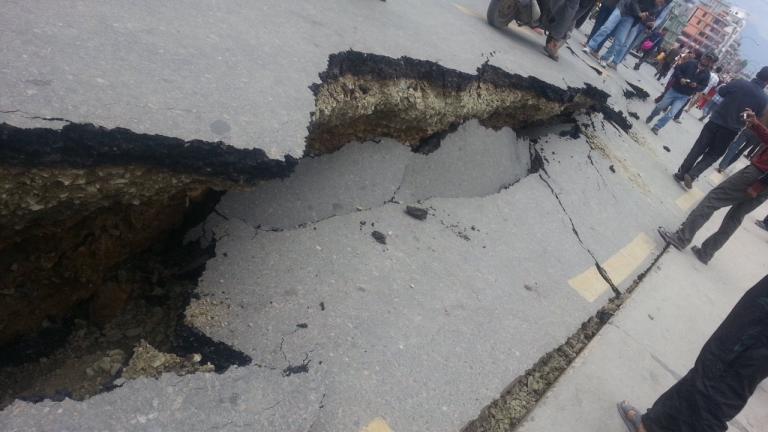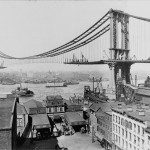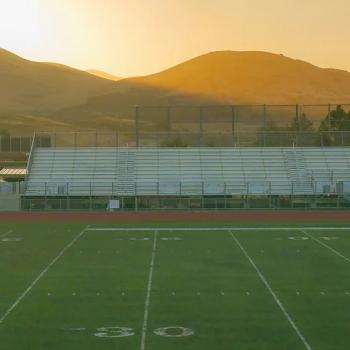Subterranean Shifts
Pictured above you see a fissure that appeared in Nepal as the result of the earthquake there in April of 2015. This divide was caused by subterranean shifts. In this post I uncover shifts that drive our work-lives and faith-ives apart. Reader take note: 1) these are forces outside of the person, one could certainly point to various issues of spiritual health 2)I am not endorsing these shifts, merely pointing out how intense the pressure is to drive faith and work apart.
8 Shifts That Drive Work and Faith Apart
- Physical vs. Spiritual. The great Greek Thinkers (Aristotle and Plato) embraced a dualistic view of life—the physical world is inherently flawed and evil, the spiritual or soulish world is inherently good. Work, belonging, to the physical world, is therefor devalued. Anything “spiritual” is superior.
- Clergy vs. Laity. Beginning in the 4th Century AD—it became common for the “most spiritually committed” to join the priesthood. And so an ecclesiastical cast system was born (no doubt influenced by Greek dualism), were the clergy were upper class and those who were called to regular work were relegated to containment in a spiritual underclass.
- This World vs. Next World. Over the last 100 years in the U.S., certain strains of Protestant Faith have leaned towards the next-world nature of the Christian faith. Life on the globe as we now know it, is merely a place to harvest souls. What is missing is the activity of God in creating and sustaining the world in real time.
- Church vs. Business. Some Christian traditions reinforce the popular trope that business is the great evil in the world. Like every single human being and every human endeavor, business is both a source of good AND of evil—its dark side can be redeemed.
- Power vs. Exile. David Kim of Redeemer Presbyterian here in NYC points out that the people of God cycled between Jerusalem seasons—where they had cultural power and great security and Exilic moments-where they were an outnumbered and vulnerable minority. Christians in the West are in exile and need to draw on the Daniels, Esthers and Nehemiahs of the scripture for appropriate models. Staying stuck in a Jerusalem model of cultural power, reinforces the divide by pitching unrealistic expectations and cultural critiques.
- Expert Culture vs. Whole Life Community. Today we have an expert culture-we employ specialists to bring their expertise to the various components of our lives. Pastors are “experts” in the domestic sphere. They have little credibility in speaking to the work sphere. This tends to lend skepticism to the notion that we could find a whole-life community—one that speaks life into every sphere of our experience.
- Public-Professional Self vs. Private Self. Decades ago in my business ethics class I was taught that I had two selves: my professional self and my private self. It was suggested that there would be times that the mores of my professional self would conflict with my personal standards. As long as the professional self wasn’t breaking the law, you did what you needed to do to fulfill standard operating procedures and expectations of your industry. This separation of selves has been institutionalized and many of us find our faith-shaped values unwelcomed in the marketplace.
- Ideal vs. Practical. If we are anything in the U.S., we are practical. What works is often our highest moral good. And so the argument goes, “it is not practical to expect Christ-followers to live out their faith in the context of work:” “business is business.” Worst-case scenario, they might lose their jobs. (and then their churches will loose their donations!).
Significant Forces Fueling the Divide
As you can see, there are significant historical, cultural, and ideological shifts that drive faith and work apart. Which ones affect you the most? What others would you suggest?
In My Next Post…
I’ll share a 3-pronged approach to bridging the faith-work divide.
Related Posts:
Why Your Pastor Doesn’t Talk About Your Work
Are There Good Liabilities for Faith @ Work?
Faith and Work Resources: I keep a current and curated list of great resources related to the faith and work conversation follow this link: Resources on Faith and Work
About the Author: Dr. Chip Roper writes Marketplace Faith from New York City, where he is the director of Marketplace Engagement at the New York City Leadership Center. You can learn more about him here. Chip is available for speaking, consulting, and speaking engagements. Inquire via email: [email protected].
Like US on Facebook: https://www.facebook.comMarketplaceInitiative/













